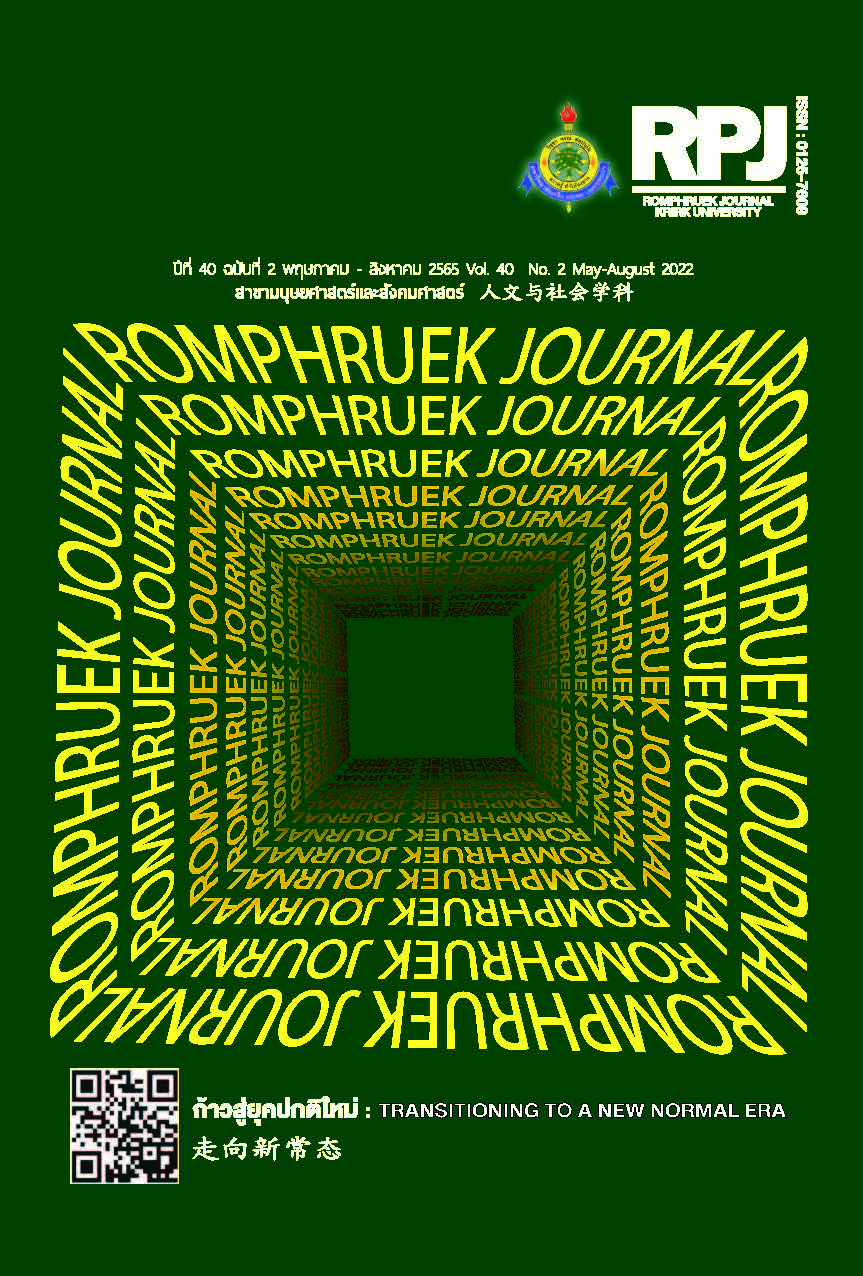ความสัมพันธ์ระหว่างงานที่มีความท้าทาย การแก้ไขปัญหาเชิงสร้างสรรค์ และผลการปฏิบัติงานเชิงนวัตกรรม โดยมีการแบ่งปันความรู้ เป็นตัวแปรกำกับ
Main Article Content
บทคัดย่อ
การวิจัยนี้มีวัตถุประสงค์เพื่อศึกษาความสัมพันธ์ระหว่างงานที่มีความท้าทาย การแก้ไขปัญหาเชิงสร้างสรรค์ และผลการปฏิบัติงานเชิงนวัตกรรม โดยมีการแบ่งปันความรู้ เป็นตัวแปรกำกับ ประชากรในการศึกษา คือ เจ้าหน้าที่ป้องกันและบรรเทาสาธารณภัย กรมป้องกันและบรรเทาสาธารณภัย และใช้แบบสอบถามเป็นเครื่องมือการวิจัย การรวบรวมข้อมูลใช้การสุ่มตัวอย่างแบบชั้นภูมิ จากเจ้าหน้าที่ป้องกันและบรรเทาสาธารณภัยส่วนกลางและภูมิภาค ได้รับแบบสอบถามที่สมบูรณ์กลับมาจำนวน 379 ชุด สถิติที่ใช้วิเคราะห์ข้อมูล ได้แก่ ความถี่ ร้อยละ ค่าสัมประสิทธิ์การถดถอย และใช้โปรแกรม Process ทดสอบอิทธิพลของตัวแปรกำกับ ผลการศึกษา พบว่า 1) งานที่มีความท้าทายมีความสัมพันธ์ในทางบวกต่อการแก้ไขปัญหาเชิงสร้างสรรค์ และผลการปฏิบัติงานเชิงนวัตกรรม อย่างมีนัยสำคัญทางสถิติที่ระดับ 0.01 และ 0.001 ตามลำดับ 2) การแก้ไขปัญหาเชิงสร้างสรรค์มีความสัมพันธ์ในทางบวกต่อผลการปฏิบัติงานเชิงนวัตกรรม อย่างมีนัยสำคัญทางสถิติที่ระดับ 0.001 3) การแบ่งปันความรู้ เป็นตัวแปรกำกับความสัมพันธ์ระหว่างงานที่มีความท้าทาย การแก้ไขปัญหาเชิงสร้างสรรค์ และผลการปฏิบัติงานเชิงนวัตกรรม อย่างมีนัยสำคัญทางสถิติที่ระดับ 0.01 และ 0.05
Article Details

อนุญาตภายใต้เงื่อนไข Creative Commons Attribution-NonCommercial-NoDerivatives 4.0 International License.
ทุกบทความที่ตีพิมพ์ในวารสารมนุษยศาสตร์และสังคมศาสตร์ร่มพฤกษ์เป็นทัศนะและข้อคิดเห็นของผู้เขียนมิใช่ทัศนะของมหาวิทยาลัยเกริกหรือกองบรรณาธิการ การนำบทความส่วนใดส่วนหนึ่งหรือทั้งหมดไปพิมพ์เผยแพร่ต้องอ้างอิงที่มาให้ชัดเจน
เอกสารอ้างอิง
กรมป้องกันและบรรเทาสาธารณภัย. (2562). รายงานสรุปข้อมูลกำลังคนของส่วนราชการกรมป้องกันและบรรเทาสาธารณภัย. (6 พฤษภาคม 2563) สืบค้นจาก http://person.diaster. go.th/inner.personnel-4.183/downloadmenu_3967.
ทศพร บุญวัชราภัย. (2558(. ความคิดสร้างสรรค์ขององค์การเพื่อสร้างนวัตกรรมบริการและผลการดำเนินงานของธุรกิจ : ปรากฏการณ์เชิงประจักษ์ของโรงแรมบูติกไทย. วิทยานิพนธ์ปริญญาดุษฎีบัณฑิต สาขาวิชาการจัดการ มหาวิทยาลัยศิลปากร, กรุงเทพฯ.
มนตรี พิริยะกุล. (2562). การวิเคราะห์อิทธิพลการกำกับด้วยโปรแกรม Process. วารสารวิชาการเทคโนโลยีอุตสาหกรรม, 15(2), 144-161.
สุเทพ ดีเยี่ยม และ ณัฏยาณี บุญทองคำ. (2563). การสร้างนวัตกรรมในบริบทภาครัฐไทย. วารสารการบริหารนิติบุคคลและนวัตกรรมท้องถิ่น, 6(3), 287-299.
สำนักงานคณะกรรมการข้าราชการพลเรือน. (2560). ระบบราชการไทยในบริบทไทยแลนด์ 4.0. (6 พฤษภาคม 2563) สืบค้นจาก https://www.ocsc.go.th/sites/default/files/document/thai-gov-system-context-thailand-4-0.pdf.
Almeshal, S. A., & Aloud, G.N. (2019). The impact of ethical climate on creative problem –solving capacity : An empirical study on human resource employees in saudi arabia. Journal of Economics, Management and Trade, 24(1), 1-13.
Amabile, T. M., Conti, R., Coon, H., Lazenby, J., & Herron, M. (1996). Assessing the work environment for creativity. The Academy of Management Journal, 39(5), 1154–1184.
Amabile, T. M. (1997). Motivating creativity in organizations : On doing what you love and loving what you do. California Management Review, 40(1), 39-58.
Carmeli, A., Cohen-Meitar, R., & Elizur, D. (2007). The role of job challenge and organizational identification in enhancing creative behavior among employees in the workplace. Journal of Creative Behavior, 41(2), 75-90.
Carmeli, A., Gelbard, R., & Reiter-Palmon, R. (2013). Leadership, creative problem-solving capacity, and creative performance : The importance of knowledge sharing. Human Resource Management, 52(1), 95–122.
Carmeli, A., Sheaffer, Z., Binyamin, G., Reiter-Palmon, R., & Shimoni, T. (2013). Transformational leadership and creative problem-solving : The mediating role of psychological safety and reflexivity. The Journal of Creative Behavior, 48(2), 115–135.
Costa, V., & Monteiro, S. (2016). Key knowledge management processes for innovation : A systematic literature review. VINE Journal of Information andKnowledge Management Systems, 46(3), 386–410.
Cronbach, L. J. (1990). Essentials of psychological testing. New York : Harpar and Row.
Fomujang, V. A., Wu, C., & Tassang, A. (2019). The assessment of a creative climate within an organization. International Journal of Science and Research (IJSR), 8(3), 310-317.
Hackman, J. R., & Oldham, G. R. (1980). Work redesign. Reading, MA : Addison-Wesley.
Hair, J. F., Black, W. C., Babin, B. J., Anderson, R. E., & Tatham, R. L. (2006). Multivariate data analysis. Upper Saddle River, NJ : Pearson Prentice Hall.
Hayes, A. F., & Rockwood, N. J. (2020). Conditional process analysis : concepts, computation, and advances in the modeling of the contingencies of mechanisms. American Behavioral Scientist, 64(1), 19–54.
Hu, M.-L.M., Horng, J.-S., & Sun, Y.-H.C. (2009). Hospitality teams : knowledge sharing and service innovation performance. Tourism Management, 30(1), 41-50.
Isaksen, S.G. (2007). The climate for transformation : lessons for leaders. Creativity and Innovation Management, 16(1), 3-15.
Lunenburg, F.C. (2011). Motivating by enriching jobs to make them more interesting and challenging. International Journal of Management, Business, and Administration, 15(1), 1-11.
Mitchell, I. K., & Walinga, J. (2017). The creative imperative : the role of creativity, creative problem solving and insight as key drivers for sustainability. Journal of Cleaner Production, 140(3), 1872-1884.
Muñoz-Pascual L., Galende J., & Curado C. (2021). Contributions to sustainability in SMEs : human resources, sustainable product innovation performance, and the mediating role of employee creativity, Sustainability, 13(4), 1-20.
Prajogo, D. I., & Ahmed, P. K. (2006). Relationships between innovation stimulus, innovation capacity, and innovation performance. R&D Management, 36(5), 499-515.
Rovinelli, R., & Hambleton, R. (1976). On the use of content specialists in the assessment of criterion-referenced test item validity. Paper Presented at the Annual Meeting of the American Educational Research Association 60 th April 19-23, 1976 San Francisco California, 37.
Singh, S. K., Gupta, S., Busso, D., & Kamboj, S. (2021). Top management knowledge value, knowledge sharing practices, open innovation and organizational performance. Journal of Business Research, 128(1), 788-798.
Steen, T., & Schott, C. (2018). Public sector employees in a challenging work environment. Public Administration, 97(1), 3–10.
Sun, Y., Hu, X., & Ding, Y. (2019). Learning or relaxing : how do challenge stressors stimulate employee creativity?. Sustainability, 11(6),1-20.
Treffinger, D. J. (1995). Creative problem solving : overview and educational implications. Educational Psychology Review, 7(3), 301-312.
Yamane, T. (1967). Statistics, An Introductory Analysis. New York : Harper and Row.


